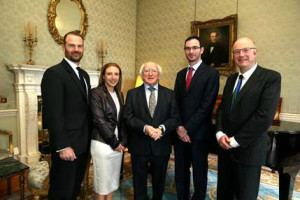
In recognition of his outstanding contribution to translational obesity research, Professor Carel le Roux (UCD Professor of Experimental Pathology) has received a President of Ireland Young Researcher award (PIYRA).
In recognition of his outstanding contribution to translational obesity research, Professor Carel le Roux (UCD Professor of Experimental Pathology) has received a President of Ireland Young Researcher award (PIYRA).
One of Science Foundation Ireland’s most prestigious accolades, this award acknowledges cutting-edge research in fields considered critical to Ireland’s economic and social prosperity.
President Michael D. Higgins said,
“This award recognises the ongoing contribution of Irish scientists to internationally respected research activity in areas of fundamental relevance to society and the economy.”
In an effort to address the increasing mortality and morbidity associated with obesity and its related diseases, Professor le Roux focuses on achieving a better mechanistic understanding of appetite control.
“If we can learn more about how the gut ‘talks’ to the brain to generate fullness, we can develop safer and more effective treatments for patients. The role of metabolic surgery, gut hormones, bile acids and changes in food preference are important areas of research focus in this quest”,
says Professor Carel le Roux, Professor of Experimental Pathology at UCD School of Medicine & Medical Science and Fellow of UCD Conway Institute.
“The immediate question for clinicians and surgeons is how to optimally use existing medical and surgical treatment to prevent or even reverse end-organ damage secondary to obesity or diabetes. By addressing this question, we can affect immediate health gain for patients and the health system.”
Professor le Roux said:
“Receiving the PIYRA has allowed me to expand our work and establish, within the UCD Diabetes Complications Research Centre, the first group in the world focusing on how changing the anatomy and physiology of the gut with surgery can be used to reverse organ damage such as diabetic kidney disease, which previously was thought of to be permanent. Improving our knowledge will facilitate health gain for patients while saving money for the health system.”
PIYRA is Science Foundation Ireland’s most esteemed award for researchers who have shown exceptional promise as possible future leaders in international research and are known for excellence in their fields. Awardees are selected on the basis of exceptional accomplishments in science and engineering and on the basis of creative research projects that have attracted international acclaim.
Commenting on the awards, Professor Mark Ferguson, Director General of Science Foundation Ireland and Chief Scientific Adviser to the Government of Ireland, said:
“PIYRA recognises outstanding researchers who, early in their careers, have already demonstrated or shown exceptional potential for leadership in their fields of research. Through this programme SFI is supporting a new generation of top-tier scientific researchers in Ireland.”
Professor le Roux received his award from President of Ireland Michael D. Higgins in Áras an Uachtaráin along with two recipients from Trinity College Dublin; Dr Matthew Campbell and Professor Valeria Nicolosi. Dr Campbell carries out research on eye conditions including age-related macular degeneration (AMD) while Professor Nicoloi researches materials that can potentially form the basis for innovative new technologies.